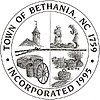Bethania, North Carolina
| Bethania, North Carolina | ||
|---|---|---|
| Town | ||
|
||
 Location in Forsyth County and the state of North Carolina |
||
| Coordinates: 36°11′4″N 80°20′5″W / 36.18444°N 80.33472°WCoordinates: 36°11′4″N 80°20′5″W / 36.18444°N 80.33472°W | ||
| Country | United States | |
| State | North Carolina | |
| County | Forsyth | |
| Area | ||
| • Total | 0.69 sq mi (1.79 km2) | |
| • Land | 0.69 sq mi (1.78 km2) | |
| • Water | 0.004 sq mi (0.01 km2) | |
| Elevation | 850 ft (259 m) | |
| Population (2010) | ||
| • Total | 328 | |
| • Density | 477/sq mi (184.3/km2) | |
| Time zone | Eastern (EST) (UTC-5) | |
| • Summer (DST) | EDT (UTC-4) | |
| ZIP code | 27010 | |
| Area code(s) | 336 | |
| FIPS code | 37-05340 | |
| GNIS feature ID | 1006108 | |
| Website | www |
|
Bethania is the oldest municipality in Forsyth County, North Carolina, United States, and was most recently incorporated in 1995, upon the reactivation of the original 1838/1839 town charter. In 2009, Bethania celebrated the 250th anniversary of its establishment in 1759. As of the 2010 census, the town population was 328.
The first planned Moravian settlement in North Carolina, Bethania exists as the only remaining independent, continuously active Moravian village in the southern United States, and is the only known existing Germanic-type linear agricultural village in the South. The 500-acre (2.0 km2) Bethania National Historic Landmark district is the largest such district in Forsyth County. Bethania and its 18th- and 19th-century properties are listed on the National Register of Historic Places.
Bethania was founded 12 June 1759 by the Moravian Brethren of Wachovia as a congregational, agricultural, and trades community. Bethania was the first planned Moravian settlement in Wachovia, and members of a "Society", under the care of the Bethania congregation, were permitted to reside in the village after July 1759. Today, Bethania's eighteenth-century German-type linear agricultural village design remains visible and intact, and most town lots and roadways have remained in continuous use since 1759. The name "Bethania" is the German form of "Bethany", the name of a village near Jerusalem recorded in the New Testament as the home of Mary, Martha and Lazarus, as well as that of Simon the Leper.
...
Wikipedia

